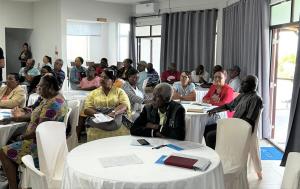Rodrigues receives training on integrated care for older people
Integrated Care for Older People (ICOPE), a comprehensive approach to providing person-centred care to older people in the context of an ageing population, attained a fresh milestone with the completion of a sensitization campaign and training of trainers (ToT) in Rodrigues in September 2024. Bringing together over 80 carers, social workers, nurses and doctors, as well as representatives of senior citizens associations and various commissions, the three-day event was a welcome exercise in knowledge sharing for this island of around 44,000 souls which has seen the proportion of people over the age of 65 climb from 7.5% to 9.1% between 2011 and 2021. Of particular interest to the participants was the dissemination of the ICOPE Strategy and screening techniques for the early detection and prevention of physical and cognitive impairments.
The need to build the capacity of health and social workers at primary healthcare level is highlighted by the fact that the share of the total Mauritian population aged 60 years or above is projected to increase from 18.7% in 2021 to 36.5% in 2061 (the country’s older population is also getting progressively older). Over 400 doctors, nurses, social workers, psychologists and dieticians have been trained on ICOPE since it was rolled out, and they continue to cascade their training to their fellow public health professionals as part of its community-based approach.
WHO supported the development of the first National ICOPE Strategic and Action Plan, which was launched by the Prime Minister of the Republic of Mauritius, Pravind Kumar Jugnauth, in March 2023. This Strategic and Action Plan, which covers the period 2022-2026, proposes seven strategic priorities to support Mauritius in providing integrated person-centred care to “address the specific needs of older people.”
In her opening address in Rodrigues, the WHO Representative, Dr Anne Ancia, stated that ICOPE provides “a clear path forward for enhancing care for older persons through community engagement, workforce development, and legislative improvements. It represents a commitment to adapting health systems to better meet the needs of an aging population. Proactively adapting our health and social service delivery systems today in order to address the specific needs of older people in an integrated manner will enable people to live longer and healthier without overburdening the health sector or the country’s economy.”
An important component of ICOPE is the early, systematic screening of physical and cognitive decline so that these impairments can be detected at an early stage, when they can still be addressed effectively and before they lead to complications or to the loss of people autonomy. In May 2024, WHO and the Ministry of Health and Wellness (MOHW) conducted a pilot for the systematic screening of 1,000 older persons to understand the need for referrals to higher health services (5 to 10% of persons screened required a higher level of care) and to plan for the expansion of these services accordingly.
The ICOPE Focal Point for Rodrigues, Dr Davidson Casimir, explains that sensitization campaign and ToT, which were conducted by the MOHW and WHO Mauritius, served to “train trainers in Rodrigues on how to detect certain health problems affecting the elderly. As we saw, one doesn’t necessarily need to be a doctor to do this. In practice, it’s a tool that allows us detect problems related to eyesight, hearing, mobility, depression and cognitive decline, such as Alzheimer’s, using simple questions and observations.”
Felicité Esther Roussety of the Ministry of Social Integration, Social Security and National Solidarity is equally enthused by the training on early screening. “It will allow people to look out for the warning signs without necessarily having to come to a healthcare facility. This can help improve quality of life whilst also reducing the burden on public finances,” she notes. “We can’t eliminate all health issues, but we can at least give a chance to elderly people to age well. It’s good to see that Rodrigues is included in the ICOPE strategy. I’m confident that the healthcare workers who’ve followed this training will be better equipped to provide quality health care to our elderly people.”
The mission to Rodrigues was also the opportunity for Dr Ancia to officially hand over an ambulance which was part of the donation by WHO of nine vehicles to the MOHW. Indeed, as part of its COVID-19 response plan, which was designed in part to address the vulnerabilities exposed by the pandemic, WHO had handed over the minivans in February 2024 thanks to contributions from the Ministry of Foreign Affairs of the Netherlands, the US Department of State and the French Ministry of Europe and Foreign Affairs.
In view of briefing all WHO collaborators on the UN’s Prevention of Sexual Exploitation, Abuse and Harassment (PRSEAH) policy, the PRSEAH focal point met with several dignitaries including the Chief Commissioner, Franceau Grandcourt, as well as the Commissioners for Women’s Affairs and Handicraft and for Health, Social Security Administration, Fire and Rescue Services, Housing, Prisons and Reforms Institutions. The Chief Commissioner expressed a willingness to introduce PRSEAH in various institutions and in the community.
